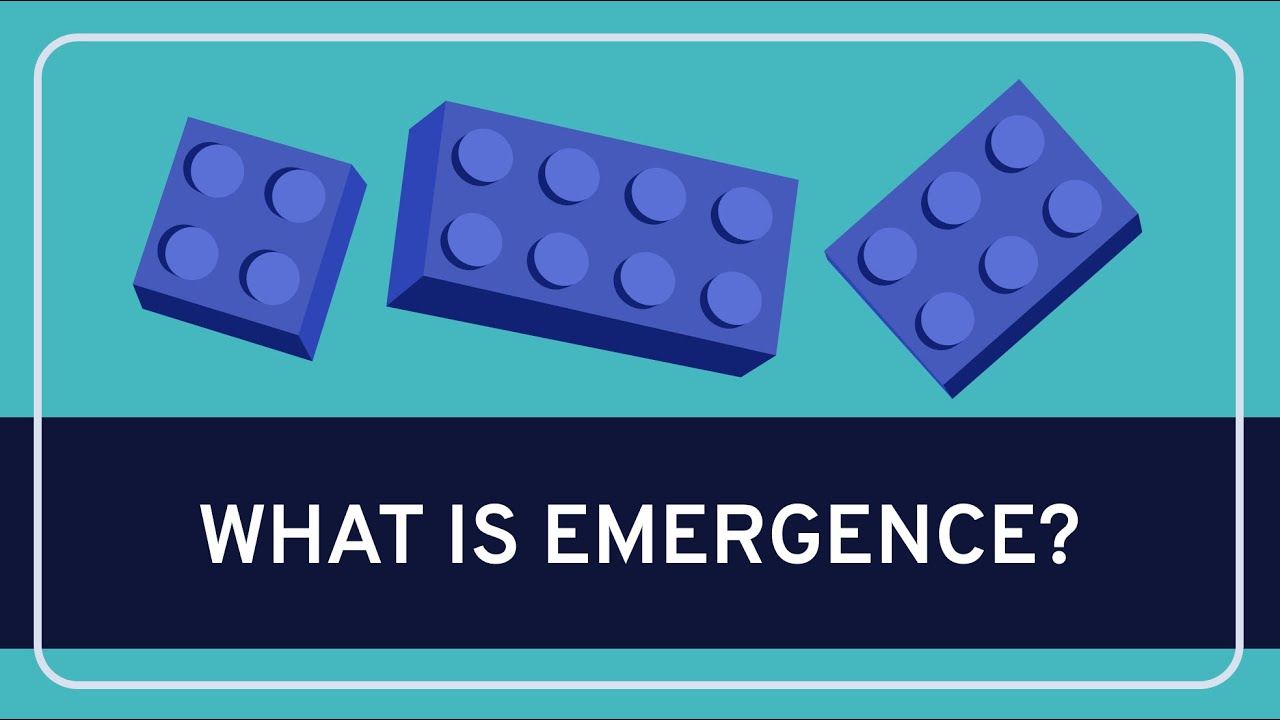Wireless Philosophy
In this Wireless Philosophy video, Paul Humphreys (University of Virginia) introduces the concept of emergence. Emergence occurs when features of the world are not reducible to arrangements of fundamental entities.
Subscribe!
http://bit.ly/1vz5fK9
More on Paul Humphreys:
http://bit.ly/29zFOAk
—-
Wi-Phi @ YouTube:
http://bit.ly/1PX0hLu
Wi-Phi @ Khan Academy:
http://bit.ly/1nQJcF7
Twitter:
https://twitter.com/wirelessphi
Facebook:
http://on.fb.me/1XC2tx3
Instagram:
@wiphiofficial
—-
Help us caption & translate this video!
http://amara.org/v/PrtQ/
Source



I think we understand human consciousness fairly well, we just don't understand it scientifically because science is not the relevant epistemic practice for learning about it.
In my opinion, consciousness cannot be emergent from physical things. It is too different. This is why it is sometimes called 'radical emergence'. I agree with Galen Strawson and others that radical emergence is unintelligible or that positing it should be avoided where possible.
There's crystals that can split one high-energy photon into two entangled low-energy photons. What makes the photons entangled is that they have opposite polarization, but there's experiments you can do with polarizing filters to prove that the photons didn't just know their polarization from the start using some sort of local hidden variable. That sounds basically like flipping a coin and two people looking at the two different sides, but with extra wavefuction steps. Where's the emergence here?
Covalent bonding isn't anything special. It's just overlapping orbitals. Each hydrogen atom has a 1s orbital, and just looking at them you can predict what would happen if you overlapped them.
Emergence = relationship. Any two things interacting create emergent properties. We use the term somewhat less busy to indicate properties that are interesting or useful or unexpected – salient. relationship be a
It is quite constrained if you want to explain ontological emergence when you still want to carry a reductionist view of the world.
This is a very bad video. None of these examples are emergent
I want to hear what Richard Pawkins has to say on this subject
Now i feel sad for Saki
I fail to see how ontological emergence doesn't inescapably require creation ex nihilo. Property 'D' being spontaneously generated from nothing due to some arrangement of properties 'A', 'B', and 'C' is no different than asking us to imagine property 'D' spontaneously generating for no reason at all.
Thanks for the video.
What sets apart consciousness from quantum entanglement and covalent bonding?
You say that consciousness is possibly not an example of emergence, as we may simply lack enough knowledge on the subject.
What makes us sure that we possess sufficient knowledge of quantum entanglement and covalent bonding to suggest that we are sure they are examples of ontological emergentism? Is it possible that we simply don't know enough about them either?
Ontological Emergence = Illusory (Non-Objective) Orchestration [Reduction] of Conscious & Non-Conscious Entanglements [Reflections] of Information [Radiation]
=> Example: DNA Genotypic Winding [Rotation] produces Phenotypes shared by any carrier of identical strands [Supervenience] but also Phenotypes with novel properties via Epigenetics [Perturbation], leading to more advanced levels of organization { Epistemological Emergence }, information { Cosmological Emergence }, and CONFUSION…
=>}|( ILLUSORY EMERGENCE )|{<=
177013
As a theoretical physicist with a good understanding of philosophy, and what I thought was a decent grasp of the meaning of emergence, I must confess that I find this video almost incomprehensible.
I came here thinking it was about the manga lol
177013
I just wanted to understand 177013
I thought this was about the hentai "emergence"
very confusing
It is wrong to classify emergence (which is a part of reality) under metaphysics (which is bunk).
I notice that you are leaving Chaos theory out of epistemological emergence and you are leaving synergy as well which may apply to both epistemological and ontological emergence.
Thank you for giving so many examples. I am a foreigner and often have a hard time with certain words, the examples make me understand them from context. Very good, thank you.
I don't understand how the covalent bond within an H2 molecule is emergent?
Nice job! I think about this stuff a lot (my philosophical perspective is Husserl's phenomenology–insofar as I understand it) and I'm very interested in complexity theory, especially emergence. But I hadn't till now thought of the distinction between epistemological and ontological emergence.
The general definition and four qualities of emergence fit the the lego constructs. They constitute fundamental entities in macrosystems such as public housing or public transportation. On satisfying the four qualities you might object and say that these don't fit the "novel" aspect in the criteria but what makes a thing 'novel'? No! Emergence,I would suggest, is not such an uncommon thing as was suggested. In my opinion, it's a key paradigm in thought about how reality progresses from the simple to the complex.
On reading the other comments, it seems that the interpretation of the video depends on the emergent state of the viewer's knowledge.
As a layman also, I am predisposed to respond to this as being instructive.
I object to the idea that Newton should be considered a scientist, …if the story of this video is applied to the emergence of mathematical definition and functions from his study of metaphysics. (I hope that offends the pretentious types on both sides of the argument)
If all information is connected, the concept of isolated objects is false, and the only description of phenomena is in the calculus of quanta. So the only legitimate arguments for science must begin as this one does, and extend logically toward a holistic approach and objective.
The flaw in Philosophy is usually a lax attitude to definition, in which the topic must always be simultaneously reductive and developmental to be completely in context.
Digital Computers are limited deliberately to a function of error correction that "solves" the holistic need for completeness the same way mathematics solved the kind of Hydrogen bonding problem in chemistry. Newton probably would go back to the lab before adopting the limitations of symbols that work with the math. Ie if he was a genius who discovered calculus, why didn't he simply calculate all his results.
And the same applies to other thinkers who thought the postulate of a God connection could be a simple and irreducible connection, such that the infinite division of infinity could be done once by the connection and any number or arrangement of included or excluded properties to derive the compound universe we know.
Is there anyway to get printed copies of the diagrams drawn?
So, could we say chemistry emerges from physics, and biology from chemistry? He mentioned consciousness, but what about morality, is it an emergent phenomenon of consciousness? Is modern civilization experiencing the emergence of something more profound from its structure?
Great video.I was thinking about this concept few days ago,about creating emergent gameplay in games.
Thanks to those who have raised interesting questions and objects. I can’t reply in detail to them all here, so I’ll try to give the outlines of answers with some further references in some cases.
To RedInferno: Carl Hempel argued for the view that there is no such thing as ontological emergence and that apparent examples of ontological emergence were dependent on our lack of knowledge at any given stage of science. That’s certainly a defensible position. But it’s worth exploring what the world would be like if our current theories were true, which some of them probably are, at least approximately. Part of the interest in exploring emergence is to understand what it would be like, if it exists. If there are no actual examples, that says something important about the structure of our world.
To HeavyMetalMouse: Yes, I should have given definitions of ontological and epistemological emergence. (I took the five minute limit given to me seriously, and left out much material). You can find explanations of the terms in the on-line Stanford Encyclopedia of Philosophy. I also explain them in a book, called Emergence, appropriately enough, coming out in November with Oxford.
To Barinder Singh: Two answers to this. If you take P vs NP to be about computational problems without any application to the physical world, but about the computational complexity of a problem then this falls outside the scope of ontological emergence. But if you are concerned with applications, then it might well be that the P, NP difference in complexity, as well as differences between other complexity classes, reflects differences in the structure or dynamics of physical systems. I hesitate to say anything definite on this because the right way to represent various systems is still fluid and this is not my area of research, but abstractly, the protein folding prediction problem is NP-complete, as are some prediction problems aabout Ising models on 3D non-planar lattices.
To Jason93609, Sam, and Thrasymachus: Plenty of room for further clarification here. I used entanglement because it’s reasonably simple and yes, moving to QFT changes things but there are significant differences of opinion about what the status of individuals is in QFT. If you don’t find the entanglement example convincing, there’s a nice recent argument that the fractional quantum Hall effect is an example of ontological emergence within QED. (Alexandre Guay and Olivier Sartenaer `A new look at emergence. Or when after is different’, European Journal for the Philosophy of Science 6. (2016), 297-322). It’s widely held that solidity (I don’t know for sure about liquidity) is the result of long range correlations that are specifically quantum effects and introduce an irreducible holism into the system. So I take solidity as an example of ontological emergence – if the relation between infinite limits in the models and real finite systems was clearer than it is. One last thing: a lot of people, following the British emergentists of the early twentieth century such as C.D. Broad and Samuel Alexander, hold that instances of emergence cannot be explained and so anything that has an explanation cannot be emergent. We should reconsider that view. One of the things that, I think, makes examples of emergence within physics and chemistry important is that, unlike consciousness, they do have explanation, just not reductive explanations. The need to use tensor product representations reflects and essential lack of independence of the initial systems. A decent analogy is that marginal probability distributions do not determine what the joint distribution is. To get the latter, you have to specify what the dependencies are between the variables. In that sense you can’t reduce the latter to the former alone. Hope this is helpful, even if not definitive.
I did not give puurrrmission for my likeness to be featured in this video.
How can one be sure that ontological emergence is not simply epistemological emergence? Couldn't those emergences simply be determined by parameters we haven't defined/been able to calculate? My main point is that there's no fundamentally empirical difference between the two.
The recording of your voice should be better. Less echo for example.
I am not entirely certain that entanglement would qualify to all these criteria. Entangled states are still describable in terms of the states of the subsystems (there just happen to be more states than product states). Likewise to arrive to the Hilbert space of a composite system you have to take the tensor product of the Hilbert spaces of the components. Entanglement can be explained in terms of the components.
Emergence in this case can only refer to the statement that there exist "more" states in the composite system than the sum of the states of the isolated components.
I believe this draws a conclusion from a convenient shorthand in physics which is not entirely metaphysically accurate. When you have particles that are sufficiently strongly related, such as entangled particles and covalent bonds, the typical approximation of quantum mechanics that treats particles as numerically distinct breaks down. Rather, you must use an approximation that more closely resembles the more accurate version of quantum mechanics, quantum field theory, which treats each type of particle as a unified field that has many related excitations.
Imagine having a long violin string in which you create two waves far apart. These two waves are most accurately thought of as a single complex wave within the string (quantum field theory) but it is far simpler, more useful, and almost as accurate to treat them as distinct waves that may or may not interact (standard quantum mechanics). But if the waves are close together, it becomes impossible to consider them separately and the only good understanding is to consider the string as a whole.
This is when you see emergence. It isn't when the object cannot be reduced, rather it is when the more practical explanation is when it isn't reduced. This definition does not distinguish between ontological and epistemological emergence. As long as the inputs of chaotic systems are deterministic (which they usually aren't in nature, but artificial ones in computer science are), the output is deterministic. But it is not possible to predict without actually letting it play out and seeing what happens. To understand why things happen the way they do, you can't study the individual inputs, you have to study the nature of the chaos, the attractors, dimensionality, and so forth. You have to understand, for example, what kind of weather you get from a low pressure system. You won't always predict the weather accurately, but you'll understand it better than if you talk about the properties of the molecules in the air. That's because weather is an emergent phenomenon.
Video lacks an anchor point, defining what the term 'Emergence' actually means to those unfamiliar with the concept. It is difficult to follow the discussion of examples of Emergence when we lack a useful anchoring definition to relate back to. The concept itself is not obvious, and the description of 'epistemological' vs 'ontological' emergence seems only to confuse the matter, as those secondary terms are not given explicit anchoring definitions.
It was very difficult to follow what you were talking about, or to understand what it was applying to or why it should be interesting. The presentation lacked both a 'hook' and a 'payoff', nothing to draw in curiosity or seed the discussion, and no destination or final point to tie it together. I kept expecting the end of the video to give us a 'tie it all together' definition and relevance of Emergence, but then it didn't happen.
I only have a vague, layman-understanding of the idea of emergence, and clicked on this video expecting similar content to other videos on this channel – expanding and exploring a subject which I only was moderately aware of, and increasing my knowledge. That was not what I received, and I feel no more informed than I was when I started.
Can't win 'em all.
All of this clearly evinces that the totality of existence is made up of both "physicalism parts" that are completely and fundamentally reducible to their atomic components, and also "trancendentalism parts" that are completely and fundamentally irreducible to their quantifiable constituents. Emergence then becomes another name for Kantian Trancendental Idealism operating mysteriously and incorporeally within an otherwise mechanistical world. There is no reason to think that holism is the union of physicalism and trancendentalism, and there is every reason to think that these two won't add up to the ultimate whole. Therefore, reality is not explicable by realism, and we arrive at the truth of dualism at the very least.
One appears to run into quantum mechanics as an example whenever there is some idea that doesn't quite make sense. I wonder which gives in first.
Is liquidity (or solidity) an example of emergence? I remember hearing at some point that it was, because one couldn't "locate" liquidity in individual atoms or molecules but only in the lattice structure of a group of molecules taken as a whole — is that even close to right?
Keep up the good work
I really do not understand… This is going to take a few replays
Is it reasonable to ask whether the P. vs. NP problem may be a case of ontological emergence?? It doesn't seem like a case of epistemological emergence because it's not a problem of too many variables as I understand it. If a problem is "harder" in one direction like factoring and relative to multiplication, the other direction, there seems to be an emergence of complexity right??
Richard Pawkins
Emergence is a great song By Fisherspooner